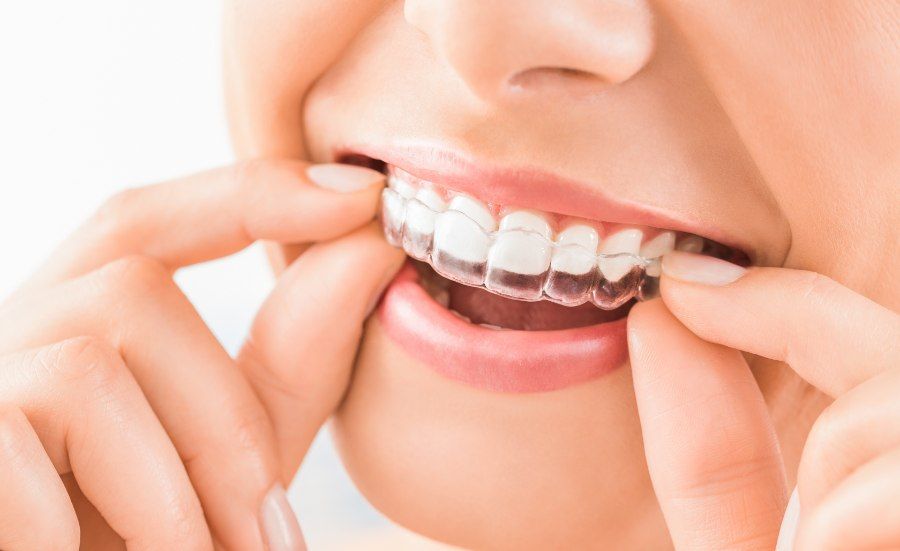Preventive Dental Care

Denver’s high altitude and dry climate may create challenges for people with clear aligners. Low humidity can dry out your aligners and your mouth, while temperature extremes can potentially affect the fit and comfort of your aligner tray.
At Hampden Ave Dental, we help patients navigate these climate-related concerns with confidence. Our expert team understands how a dry environment can impact your orthodontic treatment and help you protect your investment in a healthier smile.
This article discusses how Denver’s climate affects clear aligners and what simple, practical tips to follow to keep your aligners in top shape.
Services
Why Dry Climate Can Be a Challenge for Clear Aligner Users
If you are straightening your teeth with clear aligners, you might be surprised to learn that a dry, high-altitude environment can affect more than just your skin; it can also impact your aligners and your oral health.
High Altitude & Low Humidity
Denver sits more than 5,000 feet above sea level, and that elevation brings with it a very dry climate. The air contains significantly less moisture than you’ll find at lower elevations, which can cause both your aligners and your mouth to dry out faster than normal.
Clear aligners, typically made from medical-grade thermoplastic, rely on moisture to maintain flexibility and fit. In dry air, aligners left out of their case can quickly lose moisture, becoming stiff or slightly warped. At the same time, your mouth may also dry out more frequently, leading to comfort and hygiene challenges for aligner users.
Extreme Weather Swings
Denver is famous for its unpredictable weather. You can experience sunshine, snow, wind, and rain all in a single day. This constant shift between dry, cold winters and hot, arid summers can place additional strain on your aligners.
Whether you're hitting the slopes in January or hiking in July, your aligners are exposed to fluctuating temperatures, sun, and wind - all of which can affect how they fit and feel.
Common Effects of Dry Climate on Clear Aligners
Living in a dry climate doesn’t mean you have to sacrifice your smile goals. However, knowing how the environment affects your aligners and oral health can help you take practical measures to prevent any complications.
Aligner Dehydration & Warping
Aligners are designed to fit snugly over your teeth, guiding them gently into place over time. However, when exposed to dry air or heat over extended periods, they can lose essential moisture and become brittle or misshapen.
Even minor warping can affect how well your aligners do their job, potentially delaying your treatment progress. If your aligners feel tighter than usual, rough at the edges, or don’t sit right, they may have dried out or become warped, especially if left out of their case for extended periods.
Dry Mouth (Xerostomia)
Dry mouth is one of the most common issues for aligner users in dry climates. The lack of humidity in the air reduces your body’s natural saliva production, which plays a crucial role in keeping your mouth comfortable and clean.
Without enough saliva, your mouth can feel sticky or parched, and wearing aligners for the recommended 20–22 hours per day may become less pleasant. Dry mouth can also cause bad breath and increase your risk of oral infections.
Increased Plaque & Bacteria
Saliva helps neutralize acids and wash away food particles and bacteria. When your mouth is dry, your risk of cavities, gum irritation, and unpleasant odors increases. This risk is even higher when aligners trap debris and bacteria against your teeth and gums. Maintaining excellent oral hygiene and taking proactive steps to keep your aligners and mouth clean and hydrated is essential to prevent plaque buildup.
Tips to Protect Your Aligners in Dry Conditions
Dry climate doesn’t have to get in the way of your orthodontic progress. With a few mindful habits, you can keep your aligners in excellent condition and maintain a healthy, comfortable smile.
Protect Your Aligners from Heat
When you are not wearing your aligners, avoid leaving them out on the bathroom counter, wrapped in a napkin during meals, or directly exposed to sunlight. Exposure to dry air can lead to possible warping or distortion of the thin plastic. To keep them clean, safe, and properly hydrated, always store your aligners in their protective case when not in use.
Stay Hydrated
Drinking water consistently throughout the day is one of the best things you can do for your mouth and aligners. Proper hydration supports saliva production, which helps prevent dry mouth, keeps bacteria in check, and protects the soft tissue of your mouth from irritation.
Keep a water bottle with you and sip frequently, especially if you are spending time outdoors or in heated indoor spaces. Staying hydrated helps prevent dry mouth and keeps your aligners more comfortable to wear.
Remember to avoid sugary or acidic drinks while wearing your aligners because sugar can get trapped beneath the trays and increase your risk of tooth decay.
Maintain Excellent Oral Hygiene
Dry conditions increase the risk of bacteria and plaque buildup, so staying diligent with your oral hygiene routine is essential. Always brush and floss after meals before putting your aligners back in. This not only protects your teeth but also prevents food particles from being trapped under your aligners.
Using an antimicrobial mouthwash can also help reduce bacterial growth, freshen breath, and support overall oral health in a dry environment.
Keep Your Aligners Clean
Regular cleaning is essential to keep your aligners clear, odor-free, and free from harmful bacteria. Rinse them every time you remove them, and give them a more thorough cleaning at least once a day using a clear, aligner-safe cleanser or soaking solution. Avoid using toothpaste, which can be too abrasive and cause tiny scratches that trap bacteria and cloud the plastic.
Be Mindful of Outdoor Activities
Whether heading out for a hike, skiing in the mountains, or enjoying a sunny afternoon outdoors, take extra care to protect your aligners. A small oral care kit with a travel toothbrush, floss, and aligner-cleaning tools is a smart addition to your bag when you're away from home.
Always carry a protective case if you need to remove your aligners while on the go. It’s also a good idea to bring along the next set of aligners in your series, just in case something happens to your current pair and you need a backup.
And if you are participating in sports or physical activities, keep your water bottle close to stay hydrated and avoid dry mouth.
What to Do If Your Aligners Feel Off
If your aligners suddenly feel uncomfortable or sit too tightly against your teeth, you might be dealing with dehydration or minor warping. Other signs to watch for include rough edges, a cloudy appearance, or new pressure points that weren't there before.
If you suspect your aligners are damaged, don’t try to force them back into place, as this can irritate your gums or compromise your treatment. Instead, switch to the next tray in your series if it fits comfortably, and contact our team right away. We’ll assess the situation, determine if a replacement tray is needed, and make sure you stay on track with your smile goals.
Have questions or concerns about your aligners?
With the right habits and a little extra care, you can stay comfortable and on track with your clear aligner treatment no matter the weather.
At Hampden Ave Dental, we provide personalized dental care tailored to Denver’s unique dry, high-altitude environment. From your first consultation to your final tray, our team ensures your treatment is as comfortable, effective, and climate-conscious as possible.
To schedule a consultation for clear aligners, please call us at 303-985-1263 or request an appointment online

